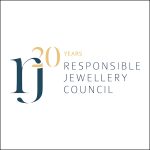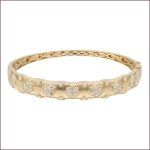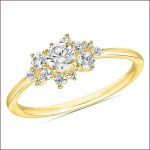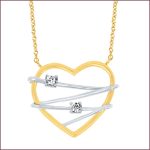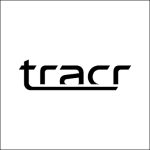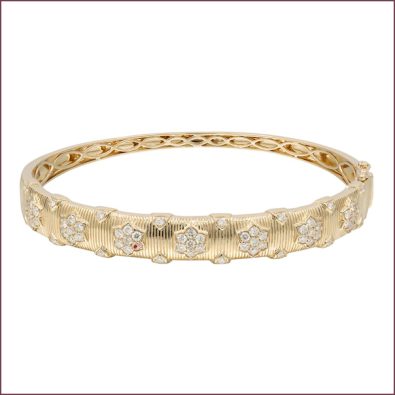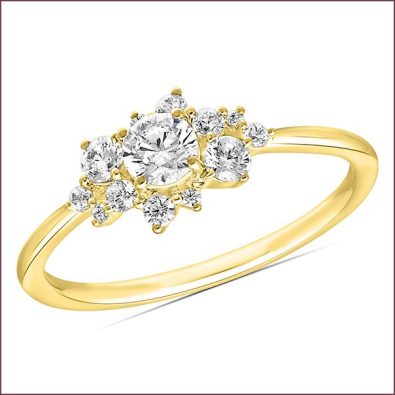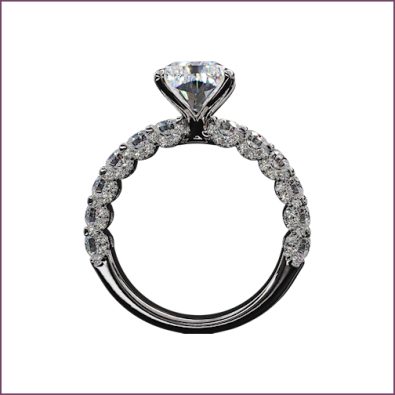Jewelry Habit Forming
Charles Duhigg, Pulitzer Prize winner, senior editor of the New York Times, and best selling author of “The Power of Habit” and “Smarter, Faster, Better” spoke at JCK Las Vegas about the science behind the sale and how to build the habits that increase sales through rewarding customer experiences.
 He started his talk for retailers at a symposium sponsored by The Plumb Club and JCK, with the story of how he got engaged. He spoke about his hesitation entering the jewelry store; how the jeweler got him talking about his girlfriend and their relationship; and after what seemed like a long, convoluted tell all, Duhigg said the jeweler told him he had just what he was looking for. And, he did!
He started his talk for retailers at a symposium sponsored by The Plumb Club and JCK, with the story of how he got engaged. He spoke about his hesitation entering the jewelry store; how the jeweler got him talking about his girlfriend and their relationship; and after what seemed like a long, convoluted tell all, Duhigg said the jeweler told him he had just what he was looking for. And, he did!
Duhigg emerged the hero, with the reward from this experience in the emotions attached to the ring—the perfect symbol of love, a smart buy, helped a village. He reminds jewelers that they are in the emotional rewards business. Retailers have to determine what rewards specific customers want.
The Habit
Capitalizing on the “habit loop” — cue – routine – reward — jewelers can influence sales. A habit is essentially a repeatable equation. Cue: An iPhone dings. Routine: Check the iPhone. Reward: A “Words with Friends” opponent made a move; your turn. We crave the ding and rush of endorphins it promises.
The cue is a trigger for an automatic behavior to start, then a routine that is the behavior itself follows, and finally a reward. What we know from Fantasy 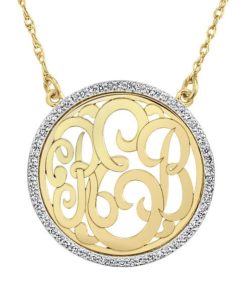 is that it’s the cues and rewards that shape how the patterns emerge.
is that it’s the cues and rewards that shape how the patterns emerge.
Duhigg illustrated how companies are adept at identifying, co-opting, and shaping our behavior to increase profits. He cited Claude Hopkins, the wizard behind Pepsodent, who in the early 1900s got us all brushing our teeth every day. Hopkins found a cue: feeling a weird film on your teeth. Through ads, he offered a solution: brush every morning. The reward: clean, bright tingly teeth.
He also talked about odor eliminating Febreze products, finding the perfect equation with housecleaning the trigger, cleaning with Febreze in the routine, and the reward is a house that smells as good as it looks.
About 40% to 45% of what we do every day is habits, says Duhigg. To create a habit you have to ensure the reward is actually rewarding. Understand the habit to help customers see what they really want.
The Story
Duhigg reminds jewelers that they’re in the storytelling business. Take the stories you know and present them in new ways that make new connections. Think Hamilton in Hip Hop. “Get people emotionally involved and intellectually curious. Think of the stories you tell and how you craft them. Force yourself to find what’s different. The cliché makes the story comfortable, the surprise delights us!”
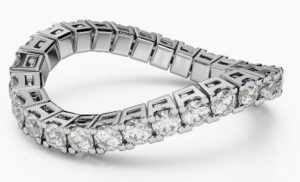 Allison Peck of Color Merchants, New York City cites the company’s latest “Sprygns” collection reflecting this directive in familiar eternity styles set with diamonds and gemstones, but in innovative stretch band design—classic look, new story. She notes that there is so much available that jewelers need to celebrate what makes them special and focus on their local market.
Allison Peck of Color Merchants, New York City cites the company’s latest “Sprygns” collection reflecting this directive in familiar eternity styles set with diamonds and gemstones, but in innovative stretch band design—classic look, new story. She notes that there is so much available that jewelers need to celebrate what makes them special and focus on their local market.
Personalized jewelry opens opportunities of cultured imperatives for jewelry as gifts and self-purchase, cites Renee Miller of Alison and Ivy, under Fantasy Diamond. “A shared message is a great way to celebrate a special moment/date between loved ones, friends and family. Same with our family loop, a great way for moms, aunts, and grandmas to feel that bond close to their hearts by wearing their kids’ names in a fashionable pendant. Moreover, names and monograms are top sellers as today’s women are strong, proud and confident. Wearing a name necklace or monogram is a way of announcing your personal brand.”
Retailers don’t need to reinvent the wheel when telling stories about their products. Miller notes that jewelers should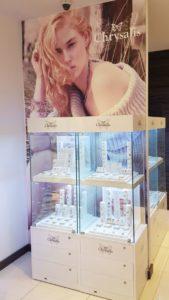 take advantage of the turnkey solutions that brands provide retailers like point of sale displays, enhanced graphics for marketing, engaging training material, and social media posts.
take advantage of the turnkey solutions that brands provide retailers like point of sale displays, enhanced graphics for marketing, engaging training material, and social media posts.
Andrea Maine, co-founder and director of the London-based Chrysalis, a Richline brand of expandable charm bangles, says its display modules have been effective assets in storytelling and sharing ideas. “Many accounts placed orders in Vegas for our new collections and upgraded their Chrysalis in-store displays with spinners and shop-in-shops,” she says. “Customers who already have them in store are reporting sales quadrupled.” The display units make you think of special moments and people, encourage the collector/historian/archivist mentality, and provide a feel good payoff for giver and receiver, who gets to recount her personal story every time someone comments on her bracelet.
